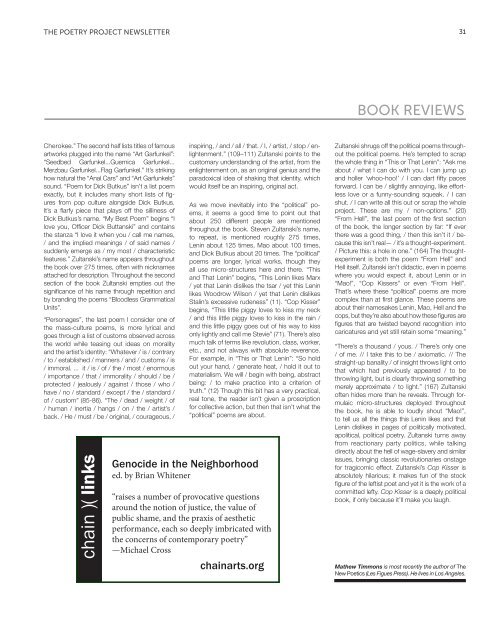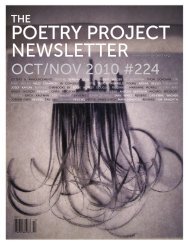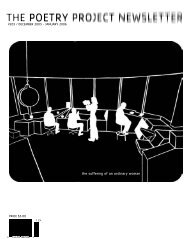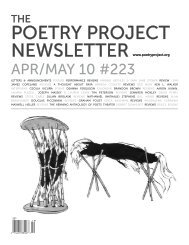30 FEB/MAR 11 #226some out of paintings, and some out of thedictionary that Scalapino combed with proceduralalexia, or word-blindness (“not as a mentaldisorder” but as “trance-like stream overridingmeaning, choice, and inhibition”). She effectsa kind of experiential demonstration of stringtheory at the level of the sentence. <strong>The</strong> titulardihedral is the angle taken between two intersectingplanes, measured by lines at right angles tothose planes. Scalapino continually intersectsplanes of reality, folding Mumbai bombings intoHenry Darger paintings into words alexicallycalled out of the unknown future.<strong>The</strong> sentences are of many more than three dimensions,and the result is a kind of topographythat, if the reader will glide across it, joins whatis, was, and could be, with what is, was, andcould be imagined. Almost always zoomed inat close scale, there is little way to anticipatewhat is coming. This means that the usual wayto read prose sentences is useless: the eyecan make no purchase on any single transferof meaning across subject and predicate. <strong>The</strong>only way I found to read was to stay slow, close,and audible. Recognition of recurrent figures—among them the base runner, the deb, theDistaffer and the race horse Amor Asteroid—issimultaneously stabilizing and disorienting, asthey accrue avatars, renewing the possible recombinationsof their meetings across so manypossible and actual worlds.I frequently think, while reading, of my own insufficiencyas a reader, and how demandingScalapino is in her severe love of language. Ittakes discipline to stay close and patient. <strong>The</strong>fragmented and enfolded language both is andisn’t in sentence form, and I frequently find myselfcaught up in a kind of flash flood inside of theseunruly containers, tumbling too fast to catch theimages. So the book teaches me how to readit, and that learning is something like learning aphysical discipline in the breaking necessary totraverse the space from the vantage of analyticaldistance to the experiential (non)interior.Sometimes I wish I could have some kind ofmagic lantern iteration of the book, and that sayfor thirty nights I could go to sleep listening toa few chapters while the text crawls illuminatedacross my ceiling. This incursion into the edgesof consciousness is perhaps the great good ofthe book, besides its astonishing beauty andcompassion and plain refusal to demarcate theserenity of an aesthetic “emerald dark” from theworld’s violence: it invites you to a rare space, apelagic space of mind. It occupies a register offiction insofar as you might put your being intoits imaginative space. But this is a fiction hoveringin the actual world, the rung overtone series ofquotidian emergencies.<strong>The</strong>re are theoretical threads within the work, butthe pleasure of it is the intense materiality of itsimages. For a work made by procedural blindness,it is all about seeing, and it is this experienceof seeing, and the way analysis breaks opennew ways to keep seeing, that makes the workso magisterial, so epic, so much like a DivineComedy stripped of verticality and splayed laterallyfor the new globalized mind. All of literaturecouldn’t sustain this porosity of visual consciousness.I imagine the experience of the text is ananalog to what Marina Abramović experiencedin “<strong>The</strong> House with the Ocean View,” when shefasted in silent exposure, staring back for 12 daysat the visitors to performance. Scalapino toooffers a rare experience, a tactile, visual, organsopenfloat-zoom through our suffering world:Daffing tortoise cylinder light continues besideher emerging from the ocean wherethe small eye in crinkled pink folds-rimmedas of an elephant eye weak at the keyholeCheney’s pink-crenellated sac forthe eye is in its flesh case there—that ofthe man who’d lay bomblets to be pickedup by children glowers looking like flowersexplode to torture tortured alteredhere then his weak small eye in midseeingappears dim is in one’s palm. (81)Karinne Keithley Syers lives in Modjeska Canyon,California. She writes things that resemble plays froma distance, most recently Montgomery Park, or Opulence,which was produced at Incubator Arts (formerlythe Ontological-Hysteric <strong>The</strong>ater). She founded the53rd State Press.Cop KisserSteven Zultanski(Book Thug, 2010)review by mathew timmonsIn first reading Steven Zultanski’s Cop Kisser, Iread what looked to be the easier poems first,and came back later to the ones that lookedhard. <strong>The</strong>re’s something about the book’sstructure and the nature of the work itself thatencourages skimming. <strong>The</strong>re are basically threetypes of poems in this book that I’ll describe inan overly generalized way. <strong>The</strong>re are list poems,the “political” poems (“This and That Lenin”,“Mao!”, “Cop Kisser”, “Lenin Minus One”, and“Hell”), and lastly the odd mass-culture reference,pop poems.I’ll go through the list poems first, as it’s fairlyeasy to describe them. “My Best Friends” followsa self-referential formula: “Steven ‘insert clevernickname here’ Zultanski / buys a ‘insert beername’ for / Steven”. <strong>The</strong> poem begins: “Steven‘Personal Growth’ Zultanski buys a Pabst for”and ends with “Steven ‘<strong>The</strong> Receiving End’Zultanski who buys an O’Doul’s for Steven‘Self-Validation’ Zultanski”. “Mao’s Moms”works like so: “My mom helps Mao’s momsteal ‘ABC’ while Mao’s Mom helps my momsteal ‘XYZ’”. <strong>The</strong> ABCs and XYZs pit Chinesevs. American cultural products. In five sections,the piece goes from food to nature, clothes,cars, art, and historical landmarks; and endswith culturally nonspecific insects. “Me And MyBrother Pee On Each Other” alphabetically listscandy bars: “My brother pees on my AlmondJoy Bar / so / I pee on his Butterfinger Bar /so / he pees on my Chunky Bar”. <strong>The</strong>y don’tactually pee on each other, but on each other’scandy bars.<strong>The</strong> second section, “Bloodless GrammaticalUnits”, consists of five poems that work likethe earlier poem, “My Best Friends”, repeatingZultanski’s name in each iteration of their formula.<strong>The</strong> first poem, “Naps”’s formula wouldbe: “Steven ‘cute baby nickname’ Zultanski /dreams of cradling his ‘developmental stage ofa baby in the womb from egg to placenta’ / ashe suckles at the nipple of / Steven”. “Nuts”is described by the formula: “Steven ‘name ofall the U.S. presidents in order’ Zultanski / fellfrom the ‘name of U.S. coins in the order theywere minted’ tree / into the field of that nut /Steven”. As the poem progresses, a few presidents’names appear as the names of coins.“Nails” moves up in rank from “Private StevenZultanski” to “Commander-in-Chief StevenZultanski” as each digs his nails into bodyparts of the next, moving from palms, wristsand arms to spine, skull and brain.Some of the mass-culture references, in [whatI’m calling the] pop poems, also employ listsin a different manner than the ones discussedabove. <strong>The</strong> first half of “Anal Cars / Art Garfunkel”lists car names paired with the word “Anal”:“Anal Ram...Anal Outback...Anal Grand
THE POETRY PROJECT NEWSLETTER31BOOK REVIEWSCherokee.” <strong>The</strong> second half lists titles of famousartworks plugged into the name “Art Garfunkel”:“Seedbed Garfunkel...Guernica Garfunkel...Merzbau Garfunkel...Flag Garfunkel.” It’s strikinghow natural the “Anal Cars” and “Art Garfunkels”sound. “Poem for Dick Butkus” isn’t a list poemexactly, but it includes many short lists of figuresfrom pop culture alongside Dick Butkus.It’s a flarfy piece that plays off the silliness ofDick Butkus’s name. “My Best Poem” begins “Ilove you, Officer Dick Buttanski” and containsthe stanza “I love it when you / call me names,/ and the implied meanings / of said names /suddenly emerge as / my most / characteristicfeatures.” Zultanski’s name appears throughoutthe book over 275 times, often with nicknamesattached for description. Throughout the secondsection of the book Zultanski empties out thesignificance of his name through repetition andby branding the poems “Bloodless GrammaticalUnits”.“Personages”, the last poem I consider one ofthe mass-culture poems, is more lyrical andgoes through a list of customs observed acrossthe world while teasing out ideas on moralityand the artist’s identity: “Whatever / is / contrary/ to / established / manners / and / customs / is/ immoral. ... it / is / of / the / most / enormous/ importance / that / immorality / should / be /protected / jealously / against / those / who /have / no / standard / except / the / standard /of / custom” (85-86). “<strong>The</strong> / dead / weight / of/ human / inertia / hangs / on / the / artist’s /back. / He / must / be / original, / courageous, /chain )( linksinspiring, / and / all / that. / I, / artist, / stop / enlightenment.”(109–111) Zultanski points to thecustomary understanding of the artist, from theenlightenment on, as an original genius and theparadoxical idea of shaking that identity, whichwould itself be an inspiring, original act.As we move inevitably into the “political” poems,it seems a good time to point out thatabout 250 different people are mentionedthroughout the book. Steven Zultanski’s name,to repeat, is mentioned roughly 275 times,Lenin about 125 times, Mao about 100 times,and Dick Butkus about 20 times. <strong>The</strong> “political”poems are longer, lyrical works, though theyall use micro-structures here and there. “Thisand That Lenin” begins, “This Lenin likes Marx/ yet that Lenin dislikes the tsar / yet this Leninlikes Woodrow Wilson / yet that Lenin dislikesStalin’s excessive rudeness” (11). “Cop Kisser”begins, “This little piggy loves to kiss my neck/ and this little piggy loves to kiss in the rain /and this little piggy goes out of his way to kissonly lightly and call me Stevie” (71). <strong>The</strong>re’s alsomuch talk of terms like revolution, class, worker,etc., and not always with absolute reverence.For example, in “This or That Lenin”: “So holdout your hand, / generate heat, / hold it out tomaterialism. We will / begin with being, abstractbeing: / to make practice into a criterion oftruth.” (12) Though this bit has a very practical,real tone, the reader isn’t given a proscriptionfor collective action, but then that isn’t what the“political” poems are about.Genocide in the Neighborhooded. by Brian Whitener“raises a number of provocative questionsaround the notion of justice, the value ofpublic shame, and the praxis of aestheticperformance, each so deeply imbricated withthe concerns of contemporary poetry”—Michael Crosschainarts.orgZultanski shrugs off the political poems throughoutthe political poems. He’s tempted to scrapthe whole thing in “This or That Lenin”: “Ask meabout / what I can do with you. I can jump upand holler ‘whoo-hoo!’ / I can dart fifty pacesforward. I can be / slightly annoying, like effortlesslove or a funny-sounding squeak. / I canshut. / I can write all this out or scrap the wholeproject. <strong>The</strong>se are my / non-options.” (20)“From Hell”, the last poem of the first sectionof the book, the longer section by far: “If everthere was a good thing, / then this isn’t it / becausethis isn’t real— / it’s a thought-experiment./ Picture this: a hole in one.” (164) <strong>The</strong> thoughtexperimentis both the poem “From Hell” andHell itself. Zultanski isn’t didactic, even in poemswhere you would expect it, about Lenin or in“Mao!”, “Cop Kissers” or even “From Hell”.That’s where these “political” poems are morecomplex than at first glance. <strong>The</strong>se poems areabout their namesakes Lenin, Mao, Hell and thecops, but they’re also about how these figures arefigures that are twisted beyond recognition intocaricatures and yet still retain some “meaning.”“<strong>The</strong>re’s a thousand / yous. / <strong>The</strong>re’s only one/ of me. // I take this to be / axiomatic. // <strong>The</strong>straight-up banality / of insight throws light ontothat which had previously appeared / to bethrowing light, but is clearly throwing somethingmerely approximate / to light.” (167) Zultanskioften hides more than he reveals. Through formulaicmicro-structures deployed throughoutthe book, he is able to loudly shout “Mao!”,to tell us all the things this Lenin likes and thatLenin dislikes in pages of politically motivated,apolitical, political poetry. Zultanski turns awayfrom reactionary party politics, while talkingdirectly about the hell of wage-slavery and similarissues, bringing classic revolutionaries onstagefor tragicomic effect. Zultanski’s Cop Kisser isabsolutely hilarious; it makes fun of the stockfigure of the leftist poet and yet it is the work of acommitted lefty. Cop Kisser is a deeply politicalbook, if only because it’ll make you laugh.Mathew Timmons is most recently the author of <strong>The</strong>New Poetics (Les Figues Press). He lives in Los Angeles.
















